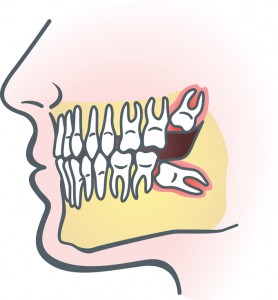
Parting with a piece of yourself is a stressful prospect. Patients tend to balk at the thought of wisdom tooth extraction, and we understand that reaction completely. But we find that those patients become far more comfortable with the process once they understand why saying goodbye to their wisdom teeth is necessary. Having those pesky third molars extracted will help pave the way for your future health and wellbeing.
How Preventive Dentistry Works
Wisdom teeth extractions are most often a form of preventive dentistry. As you may have guessed, this type of oral care prioritizes disease and problem prevention. Wisdom teeth are commonly extracted between the ages of 18-22. For many patients having their teeth pulled, these extractions take place before they’re actively experiencing molar-related pain or complications. But parting with them at that stage frees your mouth of the wisdom teeth before they can cause discomfort and damage. You won’t miss their presence, and you’ll avoid any number of future problems.
Preventive Tooth Extractions in Oakland

X-rays allow your oral surgeon to determine exactly what the extraction process will be like.
Having a tooth extracted is no cause for alarm. With a combination of dental anesthesia, dental sedation, research, and open communication, you’ll feel comfortable and anxiety-free. Dr. Ghassemi and our team will ensure that you are prepared (mentally and physically) for the procedure, and you will not feel pain during the extraction (only some pressure). After your extraction, we’ll give you detailed aftercare instructions so that you’re well-equipped for the healing process. Summit Dental’s staff is always available to answer your questions – simply contact us online or give us a call if you’re looking for help.
Why Wisdom Teeth Can Be Bad Guys
Wisdom teeth aren’t typically useful. They don’t benefit your bite or your chewing ability. Rather, they take up space and offer opportunities to dental problems. A few of the reasons wisdom teeth are commonly extracted include:
- Prevention of decay – Your molars are dangerous places. They are covered in cracks and fissures, which offer bacteria ample space to take up new homes. Because of these cracks, and because wisdom teeth are at the back of your mouth, they can be tricky to clean. Removing them takes away potential homes for bacteria and plaque, and simplifies your oral hygiene in the process (without wisdom teeth, it’s easier to floss and brush around the backs of your teeth, which are susceptible spots).
- Creating extra space – Whether for the purpose orthodontic treatment or ease of cleaning, sometimes additional space needs to be created in the jaw. Since your wisdom teeth aren’t typically useful, they’re prime candidates for removal. Without them taking up space, your other teeth will be able to spread out slightly, which can be necessary for some bites.
- Removal of impacted teeth – Wisdom teeth are often impacted, so they don’t erupt properly. Rather than coming in straight and occupying the space they should, wisdom teeth may come in sideways, at an angle. They may not even erupt fully. This will cause pressure, pushing against other teeth in your mouth. The ongoing force that impacted wisdom teeth creates can lead to changes in bite, pain, and general dental dysfunction. Patients with impacted wisdom teeth also find themselves biting their tongues and cheeks when chewing or sleeping.
Wisdom teeth are rarely beneficial, and commonly problematic. That’s a combination that we find troubling, and one that motivates preventive extractions. If your wisdom teeth need to be removed, your dentist will let you know. If you’re 18-22 and have been experiencing oral pressure, pain, and headaches, erupting wisdom teeth could be the cause. Get in touch with us to schedule a consultation.
